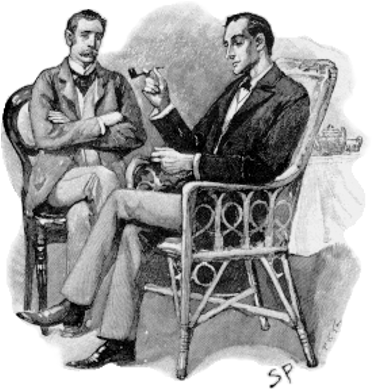Subsection 1.1.2 Deduction as its Literary Best
At the heart of logic is deduction: a process for reasoning from premises and observations to conclusions that follow from them.
At least in literature, the gold standard for powers of deduction is Sherlock Holmes. There are, for example, websites that offer to teach us how to develop Sherlock-level deduction capabilities.
“Dr. Watson, Mr. Sherlock Holmes,” said Stamford, introducing us.
“How are you?” he said cordially, gripping my hand with a strength for which I should hardly have given him credit. “You have been in Afghanistan, I perceive.”
“How on earth did you know that?” I asked in astonishment. ... “You were told, no doubt.”
“Nothing of the sort. I knew you came from Afghanistan. From long habit the train of thoughts ran so swiftly through my mind that I arrived at the conclusion without being conscious of intermediate steps. There were such steps, however. The train of reasoning ran, ‘Here is a gentleman of a medical type, but with the air of a military man. Clearly an army doctor, then. He has just come from the tropics, for his face is dark, and that is not the natural tint of his skin, for his wrists are fair. He has undergone hardship and sickness, as his haggard face says clearly. His left arm has been injured. He holds it in a stiff and unnatural manner. Where in the tropics could an English army doctor have seen much hardship and got his arm wounded? Clearly in Afghanistan.’ The whole train of thought did not occupy a second. I then remarked that you came from Afghanistan, and you were astonished.”
Doyle, Arthur Conan “A Study in Scarlet”, in Sherlock Holmes: The Complete Novels and Stories: Volumes I and II: Random House, Inc.
A finely crafted website, http://www.thescienceofdeduction.co.uk/, for a modern fictional Sherlock advertises:
I'm Sherlock Holmes, the world’s only consulting detective.
I'm not going to go into detail about how I do what I do because chances are you wouldn't understand. If you've got a problem that you want me to solve, then contact me. Interesting cases only please. This is what I do:
I observe everything.
From what I observe, I deduce everything.
When I've eliminated the impossible, whatever remains, no matter how mad it might seem, must be the truth.
If you need assistance, contact me and we'll discuss its potential.
We can’t claim that if you finish this course you’ll be Sherlock Holmes. But we hope that you will be a more acute reasoner, both about everyday events and about mathematics.

